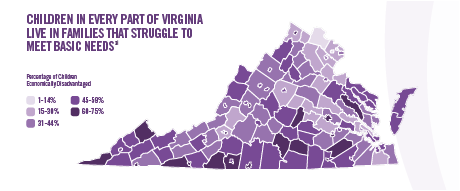

As Virginia settles into governing following the flurry of the election season, it will be important for us to look to data to guide the future direction of the commonwealth.
Voices executive director Margaret Nimmo Holland stated in the Voices Election Guide: “We know that the decisions our leaders make today impact the opportunities our children have tomorrow to be healthy, educated, and financially secure.” When we provide children with economic security, we pave the way for them to become financially stable adults who contribute to a thriving Virginia economy. To understand what we need to do to secure the well-being of children in the commonwealth, we must first understand what the data shows us about how children are faring today.
 In just the last 15 years, the number of economically disadvantaged children living in Virginia grew by almost 60,000, from 562,100 in 2010 to 621,800 in 2015. This represents a 10 percent increase that leaves us with the sobering statistic that one of every three children in the commonwealth are economically disadvantaged. Most of the 15 areas experiencing the highest rates of growth of economically disadvantaged children are suburban communities, which have traditionally been considered immune to economic hardship. It’s important to keep in mind, however, that children of every race and ethnic group in urban, suburban, and rural communities are facing economic hardship. There isn’t a single county in Virginia that isn’t facing this challenge.
In just the last 15 years, the number of economically disadvantaged children living in Virginia grew by almost 60,000, from 562,100 in 2010 to 621,800 in 2015. This represents a 10 percent increase that leaves us with the sobering statistic that one of every three children in the commonwealth are economically disadvantaged. Most of the 15 areas experiencing the highest rates of growth of economically disadvantaged children are suburban communities, which have traditionally been considered immune to economic hardship. It’s important to keep in mind, however, that children of every race and ethnic group in urban, suburban, and rural communities are facing economic hardship. There isn’t a single county in Virginia that isn’t facing this challenge.
The good news is that knowing and understanding this data and other important indicators of child well-being will guide us in asking the right questions to ensure a strong future for Virginia’s children.
So, as we enter the 2018 governing phase, we should remember to use data. When talking with your neighbors, community leaders, and state and federal representatives, advocate for children using the data found in Voices Election Guide, the KIDS COUNT Data Center, and Voices’ interactive data maps. We may be done with #VAVotes4Kids for this election cycle, but now Virginia must govern for kids.
Read More Blog Posts